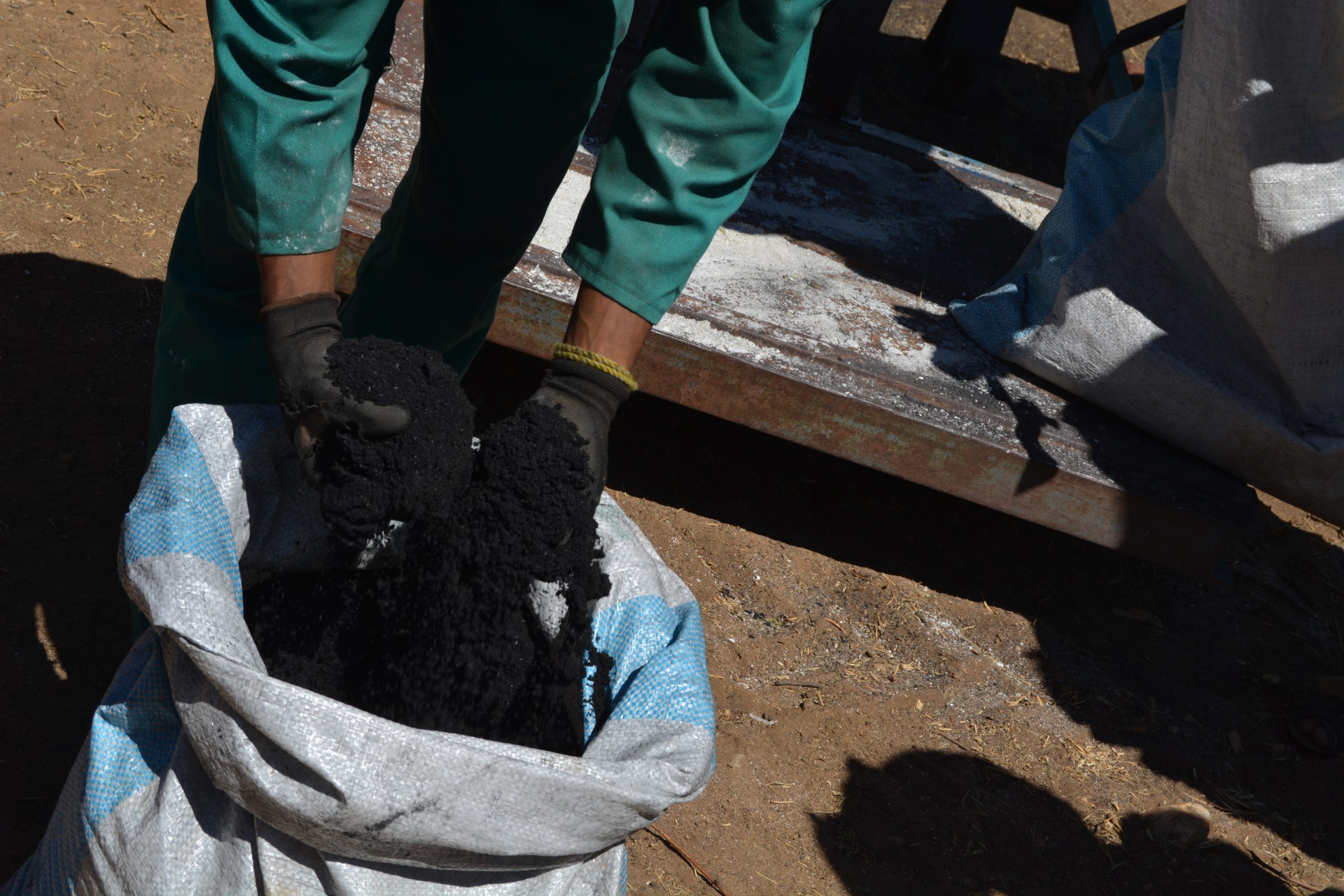According to research, adding value to encroacher bush and utilising it for a variety of products such as animal fodder, wood chips or charcoal has proven effective as a means to countering bush encroachment and achieving additional socio-economic in Namibia. Biochar from bush biomass is yet another opportunity.
In conversation with Sakeus Kafula, technical manager and co-founder of Prime-biochar.
Microbial biochar is biochar that has beneficial soil microbes added to it. It is also referred to as, biochar that has been inoculated or charged with beneficial soil microbes. According to Sakeus, there is a difference between plain biochar (biochar that has not been treated or inoculated) and microbial biochar (biochar that has been inoculated with soil microbes). Plain biochar basically holds moisture and nutrients within the soil, plain biochar plays a critical role in holding these key items within the root zone of the plant. Biochar alone, added to soil has the ability to hold water and nutrients within the root zone of the crop. To a certain extent, this can be a limitation. On the other hand; with microbial biochar, it is also able to perform this same function however with more extra benefits added to it. With microbial biochar, it`s capable of drawing essential nutrients and moisture that are far beyond the reach of the root zone of the plant and also fight off soil borne diseases. In regard with essential nutrients that are outside the reach of the plant roots, microbial biochar fills this gap and bring back these nutrients to the roots of the crop.
This is possible through the microbes that are added to the biochar, as they are able to extend their tentacles beyond the root zone level of the plant enabling to draw the moisture and nutrients towards the crops to utilise it. In a normal instance, biochar only holds what is in contact with it and this can includes; water, moisture, nutrients and fertilisers. However, if these items are not within a reasonable close range or reachable distance, plain biochar won`t fully be able to get a hold of it. As with microbial biochar, things are somehow different as they can extend to acquire these items and bring them in close contact with the crops.
What`s in for farmers, if they incorporate microbial biochar in their soil?
Sakeus believes that, the role of microbial biochar is threefold namely; reducing irrigation cost, reducing the cost of fertiliser application and creating a buffer against dry spells and pulling crops through period of water stress.
Farmers that are interested in producing a profitable crop and at the same time improving their living standards while doing it, microbial biochar then presents the best opportunity to doing this. Microbial biochar presents a big opportunity to improving soil health and fertility. Apart from biochar being treated with microbes, fertilisers can also be added. Because biochar holds moisture and nutrients, this can enable farmers to reduce the cost of frequent irrigation. For example; on a normal basis if a farmer happens to irrigate four (4) days straight in a row, with the help of biochar, the farmer will reduce that duration from four (4) days to two (2) days and in that way saving on irrigation cost.
Biochar also saves farmers on the cost of fertilisers and can enable farmers to weather through dry season when rain is pro-longed. Sakeus emphasised that, microbial biochar helps farmers to get by during difficult dry season. This is very critical because an average crop needs 120 days of sufficient soil moisture to produce optimum yields. The 120 days of sufficient soil moisture is no longer guaranteed however with microbial biochar, we can enable to restore the moisture, nutrients and the water holding capacity within the soil and thus producing high yield.
Biochar, a good source of carbon
Carbon is the main component of soil organic matter and helps give soil its water-retention capacity, its structure, and its fertility. Soil organic carbon is also important to chemical composition and biological productivity, including fertility and nutrient holding capacity of a field. As carbon stores in the soil increase, carbon is “sequestered”, and the risk of loss of other nutrients through erosion and leaching is reduced. Biochar is a rich source supply of carbon and can provides carbon to the soil and in that way enhancing the state of the soil. Biochar provides the carbon and acts as a charged battery to hold water and nutrients, releasing these to the crop when it needs it most.
The world global population is expected to reach about 9 billion people by 2050, and it`s important that we come up with innovative methods when it comes to food production but more importantly we need to keep on maintaining and preserving our soil to yield better output now and to be able to meet the needs of the future generation. Microbial biochar is then here to fill that gap as it enhances the soil and also helps in the fight to prevent soil borne diseases. Sakeus points out that, the right time to improve our soils and get them to a point where they are highly productive is now. He further said that, if we do not seize that opportunity right now, it might be just too late 20 years or 30 years down the line, to restore the quality and productivity of the soil as more damage might be done by then.
The Mycorrhizae and Trichoderma fungi microbes
On a normal rate, the soil is often filled with microbes that often breaks down organic matter and releasing the nutrients to the plants. At prime biochar, the microbes that they tend to focus on inoculating in the biochar are the Mycorrhizae and Trichoderma. The Mycorrhizae helps acts like a ladder to the plant to reach water and nutrients that is otherwise outside the reach of crop roots. On the other hands, Trichoderma acts like an army that keeps soil borne diseases and parasites away from the crop.
In his closing remarks, Sakeus emphasised that with unpredictable weather patterns and climatic changes that we are experiencing, there is a greater need to build soils that are most resilient enough against climatic and weather shocks. In situations, whereby the rain is pro-longed, our soils needs to have the moisture and still be in the position to produce crops. This is possible if we incorporate microbial biochar into our soils. At prime biochar, their products offers such an opportunity to enhance the quality of the soil at a faster rate than Mother Nature can do it. Their biochar helps retain soil moisture and nutrients, only releasing such to plant at the most appropriate times. This translates into significant savings on fertilisation and irrigation cost, which enables one to produce a more competitive crop for the market.
For further inquiry on microbial biochar; contact Sakeus Kafula (Prime biochar). Email: skafula@gmail.com




















